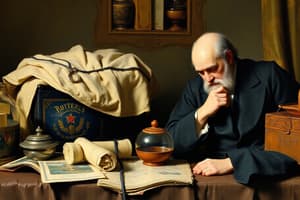Podcast
Questions and Answers
According to the passage, what is the definition of sentimental value?
According to the passage, what is the definition of sentimental value?
- The monetary worth of an object
- The emotional attachment to an object due to personal associations (correct)
- The scarcity of an object
- The utilitarian function of an object
What does the concept of complementary consumption, as described in the passage, suggest?
What does the concept of complementary consumption, as described in the passage, suggest?
- Consumers will only buy a product if it is necessary for their survival
- Consumers will buy a product to replace a lost or damaged item
- Consumers will buy a product only if it is on sale
- Consumers will buy additional products to complement a new purchase (correct)
According to Maslow's Hierarchy of Needs, which need must be relatively satisfied before higher needs become motivators?
According to Maslow's Hierarchy of Needs, which need must be relatively satisfied before higher needs become motivators?
- Esteem needs
- Love and belonging needs
- Physiological needs (correct)
- Safety needs
How do physiological needs differ from other needs according to the passage?
How do physiological needs differ from other needs according to the passage?
According to William James, what does the material self primarily consist of?
According to William James, what does the material self primarily consist of?
Why are people deeply affected by the things they own, according to the passage?
Why are people deeply affected by the things they own, according to the passage?
According to the passage, which component of the material self is described as an 'object' that we bring into the 'surface of our body'?
According to the passage, which component of the material self is described as an 'object' that we bring into the 'surface of our body'?
What does the passage suggest about how we feel when our immediate family members experience success or failure?
What does the passage suggest about how we feel when our immediate family members experience success or failure?
According to the passage, what does the body represent in terms of the material self?
According to the passage, what does the body represent in terms of the material self?
What does the passage suggest about our relationship with certain body parts?
What does the passage suggest about our relationship with certain body parts?
What does the passage suggest about how our experiences inside the home are recorded?
What does the passage suggest about how our experiences inside the home are recorded?
Which of the following best describes the overall message of the passage about the material self?
Which of the following best describes the overall message of the passage about the material self?
What does possessions become according to the text?
What does possessions become according to the text?
In the context of hoarding disorder, what does a person with this disorder experience?
In the context of hoarding disorder, what does a person with this disorder experience?
What is one common consequence of hoarding disorder on living conditions?
What is one common consequence of hoarding disorder on living conditions?
Why might someone with hoarding disorder avoid donating their belongings?
Why might someone with hoarding disorder avoid donating their belongings?
What could be a reason for someone not wanting to touch a garbage bag in the context of hoarding disorder?
What could be a reason for someone not wanting to touch a garbage bag in the context of hoarding disorder?
How are personal collections significant according to the text?
How are personal collections significant according to the text?
Flashcards are hidden until you start studying
Study Notes
Sentimental Value and Material Self
- Sentimental value refers to the emotional attachment people have to objects due to their personal experiences, memories, and relationships.
- Complementary consumption suggests that people buy and own products that complement each other to enhance their identity and self-expression.
Maslow's Hierarchy of Needs
- Physiological needs (basic needs like food, water, shelter) must be relatively satisfied before higher needs (safety, love, esteem) become motivators.
- Physiological needs differ from other needs in that they are essential for survival.
William James and the Material Self
- According to William James, the material self primarily consists of the body and its extensions, such as clothes, and the immediate family.
- The body represents the most personal aspect of the material self.
Emotional Connection to Possessions
- People are deeply affected by the things they own because they become extensions of themselves, reflecting their identity and values.
- The things people own can evoke emotions and memories, similar to how they respond to their own body parts.
The Significance of Personal Collections
- Personal collections are significant because they are a way to preserve memories and experiences, especially those related to the home.
- Possessions become a part of who we are, an extension of our selves.
Hoarding Disorder
- In the context of hoarding disorder, people experience emotional distress when parting with their possessions, leading to cluttered living conditions.
- Hoarding disorder causes people to avoid donating or discarding their belongings due to emotional attachment and fear of loss.
- One common consequence of hoarding disorder is cluttered and unsanitary living conditions.
- Avoiding touching a garbage bag may be a way for someone with hoarding disorder to avoid confronting their emotional attachment to possessions.
Studying That Suits You
Use AI to generate personalized quizzes and flashcards to suit your learning preferences.




